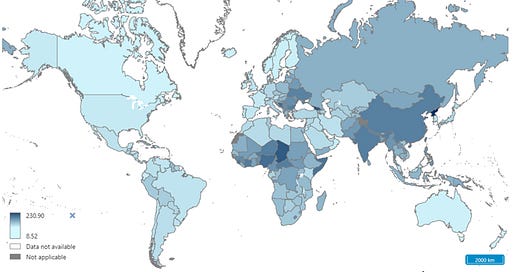Mobility Matters Daily #92 - Games, apps, and clean air zones
As well as some thanks to some good friends at NUMO
Good morning friend.
I must take this opportunity to thank the brilliant Shafaq Choudry and Jyot Chadha from NUMO, for helping me run a session on serious gaming at the Urbanism Next Europe conference yesterday. We had a lot of fun playing serious games with participants, demonstrating Streetmix, MoMobility, and Future Mobility Card Game. It was the most fun I have had at an online conference in a while!
Playing games should be part of your strategy development, but think about it
These games are part of an emerging field in transport where games are being used as part of strategy development. They can certainly generate a feeling of good will, but care must be taken in designing your games, as your outcomes are not the only ones to consider.
Designing an engaging game is tricky. Excellent research by Scott Gilman shows that learning outcomes, the ability to influence politics, and including marginalised groups need to be integrated into the game design, as well as your own outcomes. Additionally, there are challenges in designing games to facilitate meaningful deliberation, and its effectiveness in influencing policy making. This needs to be traded against making the game simple and fun to play.
The public sector should play no role in developing travel apps
Some interesting discussion is starting to take place following the publication of the National Bus Strategy and the Williams-Shapps Rail Review, both of which are advocating government developing a single, integrated app for public transport travel. The idea is to have a single app which integrates travel at a national scale. A well-meaning and logical idea. And a stupid one.
The experience of Transport for London has shown that transport authorities act best in this regard when they act as enablers of others. Simply, publish bus and rail data openly, and let others design apps and tech on top of it. Allow rapid development of apps, and let people decide what is the most useful. That is how we got CityMapper.
The arguments around Clean Air Zones continue
Recently, the Clean Air Zone (CAZ) in Birmingham was ‘soft launched,’ where the Clean Air Zone will run, but drivers will not be charged nor will they be fined for a period of two weeks for breaching the rules. This follows hot on the heels of the launch of the CAZ in Bath, which will not charge private motorists for entering the city centre. But this does not mean that arguments over them stop.
The main points boil down to this. On the one hand, why are Councils not charging the main source of many of the pollutants being tackled by CAZs. On the other hand, whilst those excluded are more likely to live in areas of poor air quality, arguments are being made that those on the lowest incomes will be more disproportionately affected by the proposals. The evidence is still emerging, and much of the analysis is theoretical at present. Though evidence from the London Congestion Charge shows a reduction in personal business trips by those on the lowest incomes that may be due to charging.
Stat of the Day

This data is a bit morbid I must say, and goes to show the scale of the air pollution issue around the world. And quite how badly the poorest countries in the world suffer compared to us in developed nations. Transport is a key source of much of this pollution, and its a truly global problem.
Source: The Global Health Observatory


